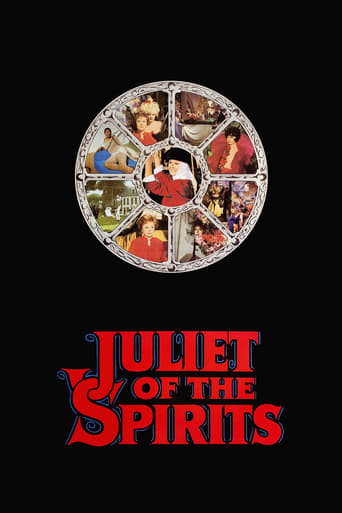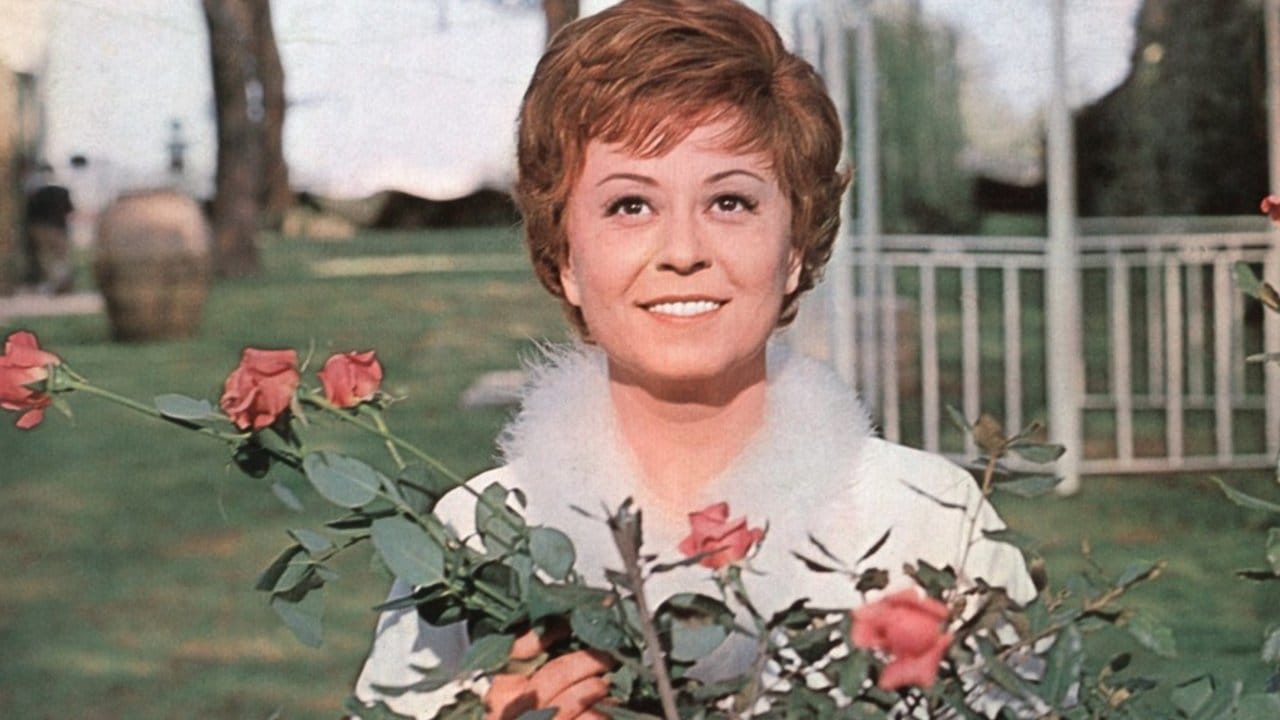popcorninhell
I do not like Federico Fellini. Yes, I know for a pretentious, overly critical self-described film fanatic, saying I don't like a director who is on the shortlist for "best ever," is blasphemous. Yes I'm aware his two dozen or so movies have been plastered all over "Sights and Sounds Magazine" for over half a century and yes I know that his personal brand of self- actualizing, self-critical, self-aggrandizing films bring a diversity to the art form social commentators love to point out, and pat themselves on the back for. But regardless of the praise, regardless of the supposed honesty behind his garish pictures, behind all the Criterion Collection essays written by men and women I respect, I still cannot ignore the fact that on a deeply emotional level I am repulsed by his oeuvre.Juliet of the Spirits is a late-period work of Fellini's and the first color film he has ever directed. The film starts with Giulietta (Masina) preparing for her anniversary with her oppressive and philandering husband Giorgio (Pisu). The anniversary turns into a party promptly followed by a seance spearheaded by a stodgy Medium (von Ledebur) and her wanton neighbor Valentina (Cortese). After the party, Giulietta discovers the doors to the spirit world have all been opened. Spirits and Neapolitan friends alike push Giulietta to indulge in her inner desires and basically let loose in a lavish, kaleidoscopic, and very loud vision of a runaway id slowly tearing itself apart.Federico Fellini is famous for his, on occasion, stifling superstition; often having mediums and palm-readers on set to give him advice on everything from his productions to his rocky personal relationship with his wife Giulietta Masina. Much like La Strada (1954), 8 1/2 (1963) and (basically insert any of his films here), there are constant callbacks to the circus; a staple of his formative years. There are also androgynous characters hinting at the man's ambiguous sexuality and gaudy set design meant to address Fellini's discombobulated psyche.How can I make these assumptions about the director? Because it's so painfully obvious not just in the first fifteen minutes of Juliet of the Spirits but in every single film the director has ever put his name on starting with La Dolce Vita (1960). Fellini seems to have no interest in addressing character, plot, societal synergy, personal growth, politics or really anything other than the inner thoughts plaguing him at the time. Yet unlike the neurotic asides of Woody Allen or the austere fatalism of Ingmar Bergman, Fellini seems to never have anything particularly interesting to say. He lives purely inside his imagination and likes to let the camera linger on lavish boudoirs, delirious orgies and Masina's micro-expressions.This exercise in cinematic "honesty" proves very gratifying to a certain class of critic who like to study film form but don't want to work too hard in their analysis. Much like the mansion that Giulietta and Giorgio call home, each shot is caked with filigree so concentrated in making a literate audience swoon, but really only being an elaborate, sumptuous facade signifying...what exactly? That deep down we're all we're all carnal but because we also like pretty things we're better than the lower creatures? Nothing makes sense so just strap in and enjoy the ride? Thanks for the tip...only one and a half more hours to go.I will give Fellini credit for trying to escape the the aesthetic orthodox of Italian Neo-Realism. But while contemporaries like De Sica, Germi and Risi evolved by using broad comedy as a jumping-off point for social commentary, Fellini implodes into a solipsistic void of vapid clap-trap. He's like the hipster of the Neo-Realist counter-movement; he knows what he doesn't want but has no idea what he's really trying to say. Thus, like his character Giudizio in Amarcord (1973) he spouts nonsense loudly and often with the cinematic equivalent of a bullhorn. Contemporary critics see this barking and assume it must mean something, I say the man hasn't had anything important to say since 1957.
gavin6942
Visions, memories, and mysticism all help a forty-something woman (Giulietta Masina) to find the strength to leave her cheating husband (Mario Pisu).This was Fellini's first feature-length color film, and he used that color as best he could. Stephen Holden wrote, "Fellini went deliriously and brilliantly bananas with the color to create a rollicking through-the-looking-glass series of tableaux evoking a woman's troubled psyche." Roger Ebert wrote, "The movie is generally considered to mark the beginning of Fellini's decline... I think it's Fellini's best movie." Now, I would not necessarily say this is his best movie, but I also would not say it was not. Indeed, it has so much going on that it is hard to ignore. Not just the color, but the fantasy. As Ebert points out, this was supposed to be Fellini's film for his wife, but is obviously still told from his perspective...
Alan J. Jacobs
Juliet of the Spirits makes more sense to me now that I can go back and rewatch and remind myself of earlier, confusing scenes, and characters who appeared and disappeared. Fellini made movies meant for DVR, only he maybe didn't know it that DVR would come to be. I recommend seeing Juliet of the Spirits once every 15 to 20 years. That's how often I've seen it. It is all about maintaining your dignity as you age and the world goes crazy around you, everyone trying to retain some piece of their former youthfulness in clownish and ghastly ways, while Juliet, the amazing Mrs. Fellini, walks through live and gazes upon it true to yourself. Spoiler alert: the last scene, when Juliet walks out of the fake sets and fake nature of a Fellini picture, and into the reality of an actual landscape (a curated landscape though it is), is timeless, worth watching over and over again.
fedor8
Did the genre section mention the word "comedy"? I didn't even chuckle once. I did yawn though.The basic story of JOTS is Masina suspecting that her hubby is cheating on her. However, this allegedly main theme seems to take a backseat to a plethora of irrelevant characters and scenes (some of which will bore you out of your mind), indulgent stuff which has deep meaning only to the man who wrote and directed it. Perhaps not even to him. If you're going to use a basic premise only as an excuse to have a whole bunch of surreal-for-the-sake of-it film-critic-pleasing sequences then you might as well go all-out and have no plot at all. That would be the more honest - and braver - approach. Why pretend to have a story when you don't.All this were forgivable if only the movie had a grand sense of style (like the surrealist yet brilliant "O Lucky Man!", for example), which it doesn't. Nice photography, to be sure (though nothing spectacular by any means), and a very pleasant and cheerful 60s soundtrack, but these two are far from making up for 135 minutes of occasional tedium. There are flashbacks and dream sequences, but they are mostly so uninteresting that you just become torn between the "stop" and the "fast-forward" buttons.But it's exactly these kinds of scenes that have shaped the empty-headed minds of movie critics in the past 50 years or so. They wet themselves as soon as a character has a surreal experience, regardless of whether it's interestingly shot or not. Surrealism at all cost, and the pretentious souls who gawk at these bizarrely overrated films swoon with sexual delight. It's almost as if some people (movie buffs and film students in particular) have an inferiority complex regarding their own intellect hence need to believe that they comprehend the incomprehensible, merely in order to feel as if they'd made some magic intellectual leap, as if "yes, I have understood a movie which most wouldn't understand or wouldn't even bother watching". It must give them some measure of comfort, the poor deluded souls, that they share a "secret" only a few of them know, namely what the movie is about, in all its supposedly great complexity and artistic worth. What baloney.Sometimes these poor souls (fans of Godard, Bunuel, Fellini and the like) finally catch some piece of "wisdom" floating about in one of those hyped films and this makes them as happy as a fisherman who'd just caught a 53-gram fish after a patient 5-hour wait. The sad truth is that what Fellini and co. "teach" us about the world and humanity can be found in any Chinese fortune cookie. Truly intelligent movies are extremely rare, and ironically almost never spring from the loins of those who are considered to be cinema's leading fortunecookienarians.Masina looks lost in her role, unable to make it work. The reason for this is obvious: she was miscast. Her husband is a wealthy, good-looking guy "who likes women", so he marries THIS? How is the viewer meant to accept this? Surreal, for sure.Masina is in nearly every scene of the movie, hence it would have been nice to actually reward the viewer's patience - for sitting through this drawn-out piece of Euro-indulgence - by giving us a gorgeous or at least reasonable-looking woman to look at. Instead, Fellini punishes us with Masina. Alas, he made a typical director's mistake, as old as film itself, of casting his wife/mistress/girlfriend in his movies. Get the BEST possible woman for the role and not your wife, just because she is desperate for movie roles and you feel you owe it to her to keep her crappy career afloat.Personally, I would have cast her as Yoda's sister, but that's about it. I don't see any other filmic uses for her.Was Fellini too under-budget to afford a mike, or does he simply prefer to dub his actors in post-production? Perhaps all the Italian boom operators were on an extended strike, dunno, Italians do have a bit of a reputation for going on strike every few days. I have noticed this awful tendency in Italian movies, a bad habit that extends well into the 80s even. I find it absurd that Fellini was filming in Italian and yet we have to watch the mouth and the sound be out-of-synch half the time. If you're going to dub it then at least make a decent effort later on. But that's the exalted European cinema for you, no perfectionists in sight, just a bunch of charlatans and deluded "artistes".JOTS is a vastly overrated Fellini mediocrity, with dream sequences and many references to art and philosophy, as if that somehow makes this movie intelligent or worthy. Laughable.


 AD
AD






